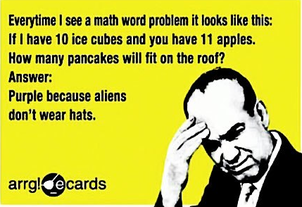 Math. Many people hate it. They feel that there are too many rules, formulas and properties. Your answer is either right or wrong. One can't have an opinion, and adequately support it resulting in a desirable grade. Many students are already pre-condition to dislike math. Often parents mention their difficulty in math classes during their school days and believe that is the reason their child struggles. Not true. Attitude, with a little bit of desire, is everything. If a student wants to do well in math, he or she will put in the effort required to do so. An important part of mathematics achievement that is consistently overlooked (I have witnessed this first hand), is increasing one's number sense through mathematical connections outside of the classroom. When I used to teach elementary school full time, I would attempt to "tap prior knowledge" at the beginning of a math lesson. For example, before starting a lesson on decimals, I would ask "Can anyone tell me where decimals can be seen?" Without fail, each year someone would respond "In the math book!" Well, that is correct but decimals can be seen in many places outside of a textbook or classroom setting. Number sense is defined as an intuitive feel for numbers and a common sense approach to using them. It is a comfort that one has which involves an understanding of how different types of numbers, such as fractions and decimals, are related to each other, and how they can best be used to describe a particular situation. Number sense is a necessary skill of all successful mathematics students, and it can be developed on a daily basis. Many students often do not connect what they are learning in their mathematics classes to what they see, hear and encounter in their daily lives. Problems and numbers that come about in the context of the students’ daily lives are more meaningful to them than traditional textbook exercises and help them develop their sense of how numbers and operations are used. Frequent use of estimation and mental computation skills is very important in developing good number sense. Here are some examples (there are many more) for students to use math outside of the classroom that don't require a lot of materials: 1. Calculating gratuity after a meal at a restaurant (percent, multiplying decimals) 2. Calculating how many gallons of gasoline can be purchased based on the price per gallon and how much is paid (multiplying decimals) 3. Cooking/baking (fractions) 4. Simple home projects [e.g. applying shelving paper] (measurement, finding area) 5. Calculating change after a store purchase (mental subtraction) 6. Calculating the cost of an item on sale in a store (fractions, decimals, percent) 7. Estimating the cost of items while shopping (rounding, estimating) 8. Traveling through time zones (elapsed time) 9. Identifying geometric shapes (e.g. railroad tracks = parallel lines, stop sign = octagon) 10. Create a scale drawing of the neighborhood (map scale)
0 Comments
Leave a Reply. |
AuthorRandy Sally Archives
June 2023
Categories
All
|

 RSS Feed
RSS Feed
